- Home
- Matthew Pearl
The Poe Shadow Page 4
The Poe Shadow Read online
Page 4
A dead man for a client… I heard Peter in my ear.
“A new trial, Poe!”
Neilson appeared to be weighing my words when his client threw himself against the cell door. “Petition for a new trial, Mr. Poe! A fair shake, at least! I’m innocent of all charges, Poe!” he cried. “That wench is an out-and-out liar!”
After a few moments, Neilson pacified his despondent client and promised him to return later.
“Someone needs to defend Edgar,” I said.
“I must attend to other work now, Mr. Clark.” He started walking briskly through the dismal cellar. He paused, then turned back to me, remarking grudgingly, “Come along to my office if you wish to speak further. There is something there you might like to see.”
We walked together down St. Paul Street. When we entered the modest and crowded chambers of his practice, Neilson commented that when he’d received my letter of introduction he’d been struck by the resemblance between my handwriting and his late cousin’s. “For a moment I thought I was reading a letter from our dear Edgar,” he said lightheartedly. “An intriguing case for an autographer.” It was perhaps the last kind word he had for his cousin. He offered me a chair.
“Edgar was rash, even as a boy, Mr. Clark,” he began. “He took as his wife our beautiful cousin, Virginia, when she was thirteen, hardly out from the dew of girlhood. Poor Sissy—that’s what we called her—he took her away from Baltimore, where she’d always been safe. Her mother’s house on Amity Street was small, but at least she was surrounded with devoted family. He felt if he waited, he might lose her affections.”
“Edgar surely cared for her more dearly than anyone,” I replied.
“Here, Mr. Clark, is what I wanted you to see. Perhaps it will help you understand.”
Neilson removed from a drawer a portrait that he said had been sent by Maria Clemm, Sissy’s mother (and Edgar’s aunt and mother-in-law). It showed Sissy, a young woman of around twenty-one or twenty-two with a pearly complexion and glossy raven-black hair, her eyes closed and her head tipped to the side in a pose at once peaceful and unspeakably sad. I commented on the life-like quality in the portrait.
“No, Mr. Clark.” He turned pale. “Death-like. It is her death portrait. After she died, Edgar realized they had no portrait of her and had this done. I do not like to show this, though, for it poorly captures the spirit she possessed in life—that pale and deathly look about her. But he valued it beyond measure. My cousin, you see, could not relinquish her even to death.”
With the portrait were some verses written by Virginia to Edgar the year before her death, speaking of living in a blissful cottage where the “tattling of many tongues” would be far away. “Love alone shall guide us when we are there,” her tender poem read. “Love shall heal my weakened lungs.”
Neilson put aside the portrait and poem. He explained that during her last years Virginia had required the utmost medical attention.
“Perhaps he did love her. But could Edgar have properly provided for her care? Edgar might have done better all along finding a woman of wealth.” Neilson paused at this thought and seemed to shift topics. “Until I was about your age, you know, I myself edited newspapers and journals and wrote columns. I have known the literary life,” he said with fallen pride. “I know its appeal to the raw spirit, Mr. Clark. Yet I have always had dealings with reality, too, and know better than to keep at something for personal gratification after it proves a losing proposition, as Edgar’s writing did. Edgar should have stopped writing. This alone might have saved Sissy, might have saved Edgar himself.”
Regarding Poe’s final months, his final attempt to obtain financial success, Neilson referred to his cousin’s aim to raise money and subscriptions for the proposed Stylus magazine by delivering lectures and visiting people of good society in Norfolk and Richmond. It was in the latter city that he renewed an acquaintance with a woman of wealth, as Neilson described her approvingly.
“Her name was Elmira Shelton, a Richmond woman whom Edgar had loved long before.” In their youth, Edgar and Elmira had promised themselves to each other before he left to attend the University of Virginia, but Elmira’s father disapproved, and confiscated Poe’s constant letters so his daughter would not see them. I interrupted Neilson to ask why.
“Perhaps,” he replied, “it was that Edgar and Elmira were young…and that Edgar was a poet…and do not forget, Elmira’s father would have known Mr. Allan. He would have spoken with him and he would have known Edgar was likely to receive no inheritance at all from the Allan fortune.”
When Edgar Poe was forced to return from college after John Allan would not pay his debts, Edgar attended a party at Elmira’s family home only to find, to his heartbreak, that Elmira was engaged to another.
By the summer of 1849, when they met again, her husband had died, as had Virginia Poe. The carefree girl of so many years ago was now a wealthy widow. Edgar read her poems and reminisced with good humor about their past. He joined a local chapter of a temperance society in Richmond and swore to Elmira to keep their oath. He said love that hesitated was not a love for him and he gave her a ring. Theirs would be a new life together.
Only weeks later Edgar Poe would be found at Ryan’s, here in Baltimore, and rushed to the hospital, where he’d die.
“I had not seen Edgar for some years toward the end. It was a great shock, you will imagine, Mr. Clark, when I was told he was found at one of the places of election in Old Town in poor condition and carried to the college hospital. My relation, a Mr. Henry Herring, was called to the scene at Ryan’s. At what time Edgar arrived in Baltimore, where he spent the time he was here, under what circumstances, all this I have been unable to ascertain.”
I showed my surprise. “You mean you sought this information on your cousin’s death, and could not find it?”
“I felt it my duty to try, relationships and so on,” he said. “We were cousins, yes, but we were also friends. We were the same age, Edgar and I, and he was not old enough to see the end of his life. I hope my own death is peaceful and in plain sight, somewhere surrounded by my family.”
“You must have found something more?”
“I’m afraid that whatever happened to Edgar has accompanied Cousin into the grave. Is this not sometimes the course of a life, Mr. Clark, for death to swallow a man up so wholly there are no traces left? To leave not a shadow, not even the shadow of a shadow.”
“That is not all that is left, though, Mr. Poe,” I said, insistently. “Your cousin will be remembered. His works are immensely powerful.”
“There is a kind of power to them. But it is usually the power of disease. Tell me, Mr. Clark, do you know something more about Edgar’s death?”
I did not tell him about the man who warned me to stop looking at Poe’s death. Something stopped me. Perhaps this hesitation was the true beginning of the investigation. Perhaps I already suspected that there was more to this situation, more to Neilson Poe, than I’d yet been able to see.
He could not even say much about Edgar Poe’s condition after he was rushed to the doctors from Ryan’s. Once Neilson had arrived at the hospital, the physicians advised that he not enter Edgar’s room, saying the patient was too excitable. Neilson only saw Poe through a curtain, and he looked from that vantage point like another man altogether, or a ghost of a body he had known. Neilson did not even have the chance to view the body before it was closed into the coffin.
“I’m afraid there’s nothing more I can tell you about the end,” he sighed. Then he said it. The eulogy that I could not forget. “Edgar was an orphan in every way. He had seen much of sorrow, Mr. Clark, had so little reason to be satisfied with life that, to him, the change, death, can scarcely be said to be a misfortune.”
My frustration at Neilson Poe’s complacency inspired me to call on the offices of a few newspapers with a faint hope of persuading them to at least pay better tribute to the genius of Poe. I described Poe’s paltry burial and the many erroneous facts in
the short biographies so far published in the papers, hoping they would improve. But these visits were useless. At the office of one of the Whig newspapers, the Patriot, some reporters overheard me and, calling to mind that Poe wrote for the press, suggested with great solemnity that they take up a subscription to pay for a marker on Poe’s grave to honor a fallen fellow. As though Edgar Poe were simply another spinner of newspaper tales! Note, too, that I would not make the error of saying, as the periodical press had taken to doing, Edgar Allan Poe. No. The name was a contradiction, a chimera and an unholy monster. John Allan had taken in the poet as a young child in 1810, but later ungenerously abandoned him to the whims of the world.
Passing the Presbyterian burial yard on my way home late one afternoon, I decided to see the poet’s resting place again. The old cemetery was a narrow block of graves on the corner of Fayette and Greene streets. The location of the grave was near the fine marker of General David Poe, a hero of the Revolutionary War and Edgar Poe’s grandfather. But there was something disconcerting.
Poe’s own spot was still unmarked. It looked as though it had never been prayed over.
Invisible Wo! I could not stop from thinking of the ravages of the “conqueror worm,” as Poe had called our bodies’ final attacker. And the angels sob at vermin fangs in human gore imbued.
With sudden purpose, I marched deeper into the burial ground. Peering around I saw steps leading down into one of the old underground vaults. Following these steps straight down, I found the sexton, Mr. Spence, reading a book in a low-arched granite crypt deep below the surface. There was a table, a bureau, a washstand, a medium-sized looking-glass. Even once a church was built on the burial ground a few years later, it was said that George Spence still preferred these vaults. But it rather astonished me then.
“You don’t live down here, do you, Mr. Spence?” I asked.
He was troubled by my tone. “When it is too cold down here, I stay above. But I like it better here. It’s more quiet and independent. This vault, in all events, was emptied out some years ago.”
Several decades earlier, he explained, the family who owned this particular tomb had wanted to move the bodies of their ancestors to more spacious accommodations. But when the tomb was opened, it was discovered—by the previous sexton, Spence’s father—that one of the bodies exhibited that rare occurrence: human petrifaction. The body, top to bottom, was entirely stone. Superstitions spread quickly. No member of the church since would agree to bury their dead in that particular vault.
“Devilish horror, coming upon a stone man when you are no more than a boy,” the sexton said. He found a chair for me.
“Thank you, Mr. Spence. There is something wrong. The grave of Edgar Poe, buried last month, is still unmarked! The grave lies level with the ground.”
He shrugged philosophically. “It is not my decision, but that of the party that had charge of burying him. Neilson Poe and Henry Herring, Poe’s cousins.”
“I passed here the day of the funeral, and could see it was small. Were there other relatives of Poe’s besides them present?” I asked.
“There was one other. William Clemm, of the Caroline Street Methodist Church, performed the service and I believe he was a distant relation of the family. Reverend Clemm had prepared a lengthy discourse, but there were so few present for the funeral, it was decided he would not read it. There were only two mourners in addition to Neilson Poe and Mr. Herring. One was Z. Collins Lee, a classmate of Poe’s. Peace be to his ashes!”
“Mr. Spence?”
“That is something I remember the minister said over Poe’s grave. Peace be to his ashes. I was surprised to hear about Mr. Poe’s death at first. He will always be a young man in my mind, not much older than you.”
“You knew him, Mr. Spence?”
“When he lived in Baltimore, in Maria Clemm’s little house,” the sexton replied musingly. “It was years ago. You would have been hardly older than a boy. Baltimore was a quieter city then; one could keep track of names. I used to see Edgar Poe wander about the burial ground now and again.”
He said Poe would stand before the graves of his grandfather and his older brother, William Henry Poe, both of whom he’d been separated from in childhood. Sometimes, said the sexton, Edgar A. Poe would examine names and dates on the tombs and quietly ask how this one was related to that one. When Spence would meet Poe out on the streets, the poet would sometimes say “good morning” or “good evening,” and sometimes he would not.
“To think such a fine gentleman should look as he did at the end.” Spence shook his head as he spoke.
“How do you mean, Mr. Spence?” I asked.
“I recall he always had a fastidiousness about his dress. But that suit he was wearing when he was found!” he said as though I should know perfectly well. I motioned for him to continue, so he did. “It was thin and ragged and did not fit him at all. It could not have been his. It was for a body perhaps two sizes larger! And a cheap palm-leaf hat one would not bother to pick up from the ground. A man from the hospital offered a better black suit to bury him in.”
“But how did Poe come to be wearing ill-fitting clothes?”
“I cannot say.”
“Do you not think it utterly strange?”
“I suppose I have not thought of it much since then, Mr. Clark.”
Those clothes were not meant to be worn by Poe. Poe’s death had not been meant for him, I thought, an irrational and abrupt notion. I thanked the sexton for his time and began rapidly to ascend the long stairs that rose from the vaults, as though once I’d secured the top there would be some immediate action to take. Suddenly seized by a momentary foreboding, I stopped in the middle of the stairs, tightening my grip on the handrail. The wind had grown worse outside, and as I reached the top I could barely direct myself to cross back into the upper world.
When I emerged, my eyes drifted to the spot of Poe’s unmarked grave for one last look. I nearly jumped at what I saw. I blinked to make certain it was real.
It was a flower, a fragrant, blossoming flower lying incongruously atop the grass and dirt of Edgar Poe’s plot. A flower that had not been there just a few minutes before.
I gasped for Mr. Spence, as though there was something to be done, or as though he could have seen something I hadn’t while we were both sitting together below the earth in that tomb. Down in the vault the sexton could not hear me calling. Dropping to my knees, I inspected the flower, thinking perhaps it had blown from another grave. But no. Not only did the flower sit there, there, but also its stem broke firmly through the dirt on top.
Suddenly there was the noise of horses stepping and wheels clicking slowly to life. I peered around and could see a medium-sized carriage cloaked by the mist. I ran toward the gates to try and see who was there, but I was instantly blocked. A dog bounded into view. The dog barked voraciously at my ankles. I tried to steer around her, but the canine pounced to the side, growling and snarling from behind the gravestones.
The dog had clearly been trained to prevent Baltimore’s “resurrection men” from attempted thefts of our corpses, and perceiving me run had identified me as one of those miscreants. Finding some ginger-nuts in my coat, I offered them up, and the mongrel soon befriended me. But by the time I could safely reach the street, the carriage had vanished into the distance.
3
I WAS STIRRED awake the next morning only by the muffled sounds from the servants below. I washed and dressed rapidly. But at this hour, no carriages were found for hire near my house. Luckily, I found a public omnibus that happened to be boarding.
Having not traveled by public conveyance as of late, I was struck by how many strangers to Baltimore were aboard. This I thought from their dress and speech, and their watchfulness of the people around them. It led me to wonder…. I happened to be carrying among my papers a portrait of Poe from a biographical article published a few years before. At the next stopping-place I turned to the rear of the bus. When the conductor finished collecti
ng tickets from the newcomers, I asked him whether the man pictured in the magazine had been his passenger in the last weeks of September. That was the time—I had estimated from the more reliable newspaper accounts—that Poe would have arrived to Baltimore. The conductor murmured “Don’t recall ’m,” or something in the same fashion.
A slight comment, I know! Hardly worth any excitement? Yet I felt the flash of accomplishment. In a single moment, though rebuffed, I had acquired knowledge that Poe had not been in this particular omnibus during this conductor’s watch! I had solicited a small share of the truth behind Poe’s final passage through Baltimore, and that contented me.
Since I had to move about the city anyway, it could not hurt to ride the omnibus more frequently and, when I did, ask such questions.
You have no doubt noted that Poe’s time in Baltimore had not seemed to be premeditated. After becoming engaged to Elmira Shelton in Richmond, he had announced his intentions of going to New York to complete his future plans. But what had been the poet’s whereabouts and purposes here in Baltimore? Baltimore should not be so indifferent as simply to lose a man, even in its dingiest shipping quarters—it was not Philadelphia. Why had he not traveled straight to New York after sailing here from Richmond? What had happened over the course of five days between leaving Richmond and being discovered in Baltimore and what had brought him into such a state that he would be wearing someone else’s clothes?
After my visit to the burial ground, I’d been bent on directing to these questions my own faculties of intelligence, which I would humbly measure against those of any man—at least any man I had yet known (for this was about to change).
There was that one momentous afternoon when the answers seemed to come improbably into view. Peter had been delayed at court, and our desks were empty of new work. I was walking away from the Hanover Market and was stepping to the Camden Street curb with an armful of packages.

 The Dante Club
The Dante Club Dante Club
Dante Club The Poe Shadow
The Poe Shadow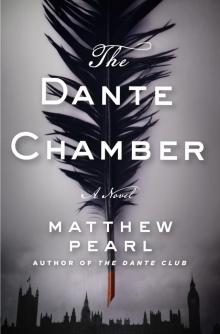 The Dante Chamber
The Dante Chamber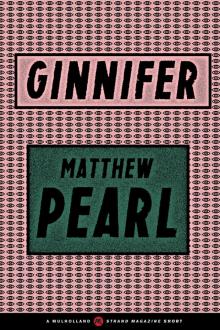 Ginnifer
Ginnifer Company Eight
Company Eight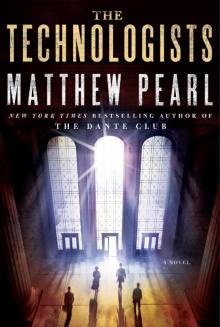 The Technologists
The Technologists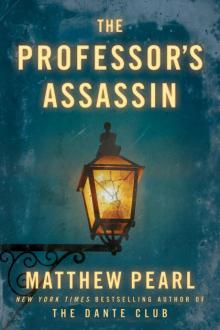 The Professor's Assassin
The Professor's Assassin The Last Bookaneer
The Last Bookaneer Company Eight (Kindle Single)
Company Eight (Kindle Single)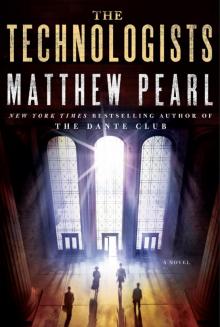 The Technologists: A Novel
The Technologists: A Novel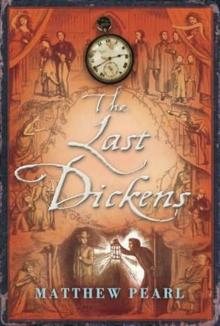 The Last Dickens
The Last Dickens